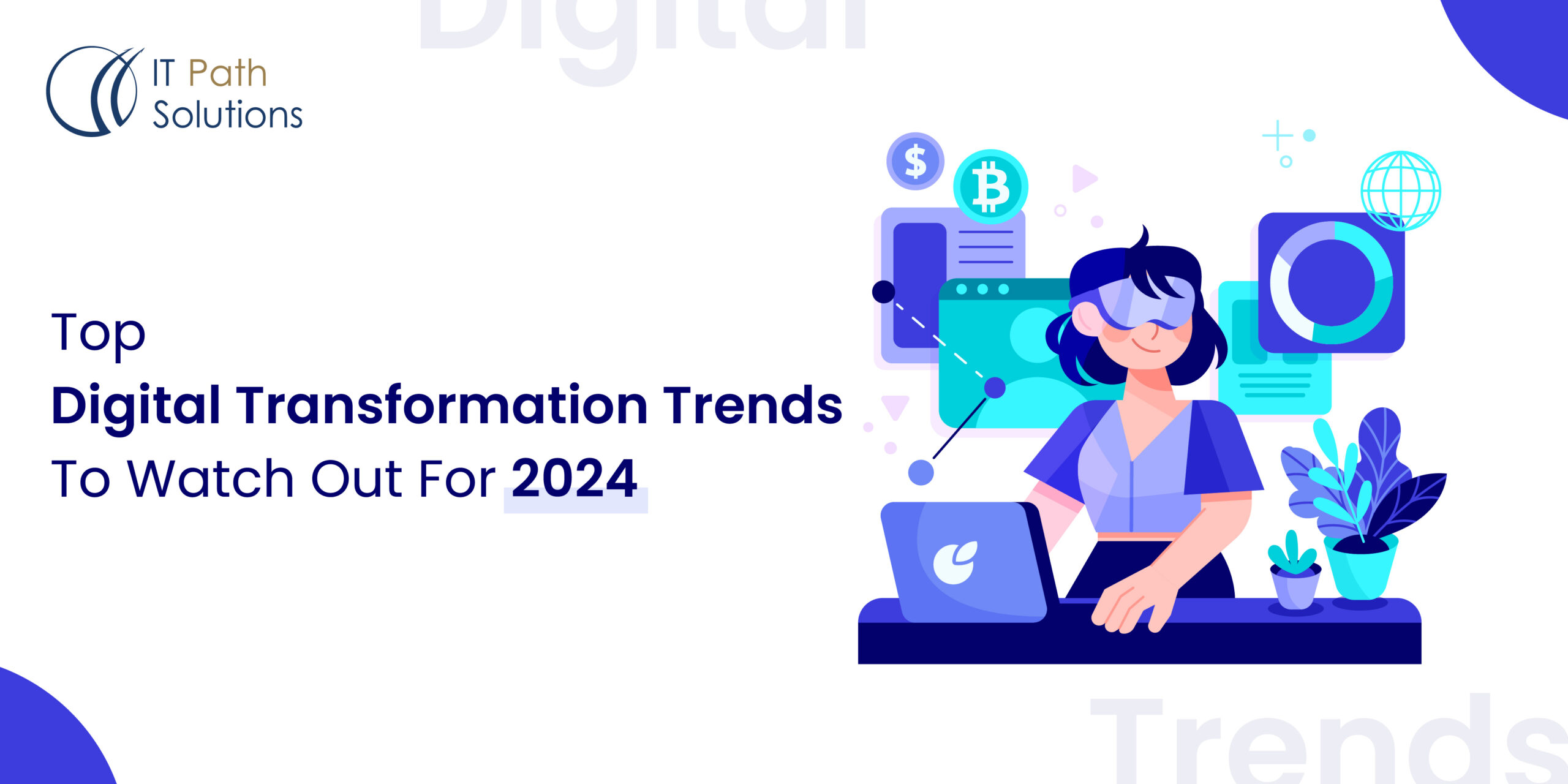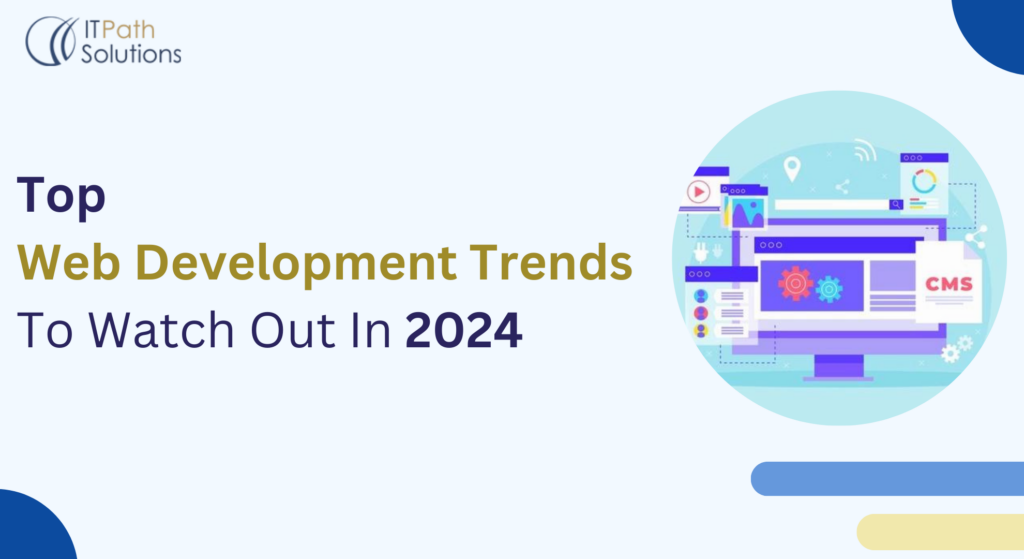Top Digital Transformation Trends To Watch Out For In 2024

Digital Transformation Trends
In the fast-paced world of technology, digital transformation has become more than just a buzzword; it’s a strategic imperative for businesses looking to stay relevant and competitive. As we step into 2024, the digital landscape continues to evolve, presenting new opportunities and challenges for organizations across industries. In this blog post, we’ll explore the top digital transformation trends that are poised to shape the business landscape in the coming year.
As per Statista report, the spending on digital transformation globally is forecasted to reach USD 3.4 trillion by 2026.

AI and Machine Learning Integration
Artificial Intelligence (AI) and Machine Learning (ML) have been at the forefront of digital transformation, and their significance is only expected to grow in 2024. Businesses will increasingly leverage AI and ML algorithms to analyze vast datasets, gain actionable insights, and automate complex processes. From customer service chatbots to predictive analytics, the integration of AI and ML will enhance decision-making capabilities, optimize operations, and drive innovation.
Generative AI
As we step into 2024, the capabilities of Generative AI are expanding rapidly, revolutionizing various industries and pushing the boundaries of what was once deemed possible. Generative AI refers to a class of algorithms that have the ability to generate new content, whether it be text, images, videos, or other forms of data. Unlike traditional AI systems that rely on predefined rules, Generative AI leverages vast datasets to learn and create content autonomously.
In 2024, Generative AI will be one of the major digital transformation trends, particularly in the form of NLG, will continue to advance, enabling machines to generate human-like text with unprecedented accuracy and coherence. Generative AI stands at the forefront of digital transformation, poised to redefine how we create, communicate, and innovate in 2024. From personalized learning experiences and AI-generated marketing content to breakthroughs in healthcare diagnostics, the impact of Generative AI is far-reaching. As organizations embrace this transformative technology, it is essential to navigate the ethical considerations and security challenges that accompany its widespread adoption. The year 2024 holds the promise of a more creative, efficient, and collaborative future, driven by the symbiotic relationship between human ingenuity and the power of Generative AI.
Intelligent Applications
In 2024, the trends in intelligent applications continue to evolve, with AI-powered chatbots, voice-assistance, and intelligent search leading the way.
- AI-powered chatbots are becoming more sophisticated, offering personalized and context-aware interactions, enhancing user engagement and customer service. Organizations are increasingly adopting AI-powered chatbots to enhance customer service, streamline communication, and provide instant support.
- Voice-assistance: In 2024, voice-assistance technology has transcended its initial novelty, becoming an integral part of our daily lives. The trend is moving towards increased integration across a wide range of devices, from smartphones and smart speakers to cars and household appliances, providing users with seamless and hands-free control options.
- Intelligent search systems: These are adopting advanced algorithms, machine learning, and natural language processing to deliver even more precise and relevant results, improving the overall user experience. The trend towards intelligent search is driven by the increasing complexity of user queries and the vast amount of data available online. Users now expect search engines not only to retrieve information but also to understand the meaning behind the search and deliver results that align with their needs. This has led to the integration of AI technologies that analyze user behavior, preferences, and historical data to refine search results continuously.
As we move into 2024, these digital transformation trends signify a growing reliance on AI to create smarter, more intuitive applications that cater to the evolving needs of users.
Cloud Computing
Cloud Computing empowers organizations to scale their operations seamlessly, adjusting resources based on demand. In 2024, this scalability has become integral to digital transformation strategies, allowing businesses to adapt to changing market dynamics with agility. Cloud platforms facilitate innovation by providing easy access to a myriad of services, from artificial intelligence and machine learning to advanced analytics and Internet of Things (IoT) capabilities. With these tools readily available, organizations can experiment, iterate, and deploy new solutions at a pace previously unimaginable, fostering a culture of continuous innovation. Cloud service providers invest heavily in robust security measures, including encryption, access controls, and threat detection, offering a level of protection that is often challenging for individual organizations to achieve. Cloud Computing stands at the forefront of digital transformation trends in 2024, driving innovation, scalability, and efficiency across industries.
5G Technology Revolution
The rollout of 5G technology is set to redefine the way businesses operate in 2024. With faster and more reliable connectivity, organizations can enhance their digital infrastructure, enabling real-time data transmission and communication. This opens up new possibilities for augmented reality (AR), virtual reality (VR), and the Internet of Things (IoT), providing a foundation for the development of smart cities, autonomous vehicles, and immersive customer experiences.
Cyber Security Prioritization
As digital transformation trends accelerates, so does the need for robust cybersecurity measures. In 2024, organizations will prioritize cybersecurity to protect sensitive data and ensure the integrity of their digital assets. With the increasing frequency and sophistication of cyber threats, businesses will invest in advanced security solutions, including AI-driven threat detection, encryption technologies, and employee training programs to create a resilient defense against cyberattacks.
Blockchain Beyond Cryptocurrency
While blockchain technology gained popularity with the rise of cryptocurrencies, its application extends far beyond digital currencies. In 2024, businesses will explore blockchain for enhancing transparency, security, and efficiency in various processes. From supply chain management to identity verification, blockchain will play a pivotal role in creating trust and traceability across industries, revolutionizing traditional business models.
Edge Computing for Real-Time Processing
Edge computing will continue to gain traction in 2024 for digital transformation trends as organizations seek to process data closer to the source, reducing latency and enhancing real-time capabilities. This trend is especially crucial for applications that demand low latency, such as autonomous vehicles, smart manufacturing, and healthcare. By decentralizing computing power, edge computing ensures faster decision-making and improved overall system performance.
Digital Twin Technology
Digital twin technology involves creating a virtual replica of physical objects or processes, allowing businesses to monitor, analyze, and optimize performance in real-time. In 2024, digital twin adoption will rise across industries, from manufacturing and healthcare to urban planning. This technology enables organizations to gain deeper insights into their operations, predict potential issues, and simulate scenarios for better decision-making.
Augmented Reality (AR) in Customer Engagement
As consumers increasingly seek immersive and personalized experiences, augmented reality will become a key player in customer engagement strategies. In 2024, businesses will leverage AR to create interactive and personalized shopping experiences, virtual product trials, and enhanced customer support. This technology will not only drive customer satisfaction but also contribute to increased brand loyalty and differentiation in the market.
Sustainable Digital Transformation
Sustainability is a growing concern, and businesses are recognizing the importance of incorporating environmental considerations into their digital transformation strategies. In 2024, organizations will focus on sustainable practices, such as optimizing energy consumption, reducing electronic waste, and adopting eco-friendly technologies. Sustainable digital transformation will not only benefit the planet but also enhance brand reputation and attract environmentally conscious consumers.
Conclusion
As we look ahead to 2024, the digital transformation landscape promises exciting developments that will reshape the way businesses operate and interact with their stakeholders. From the integration of cutting-edge technologies like AI and 5G to a renewed focus on cybersecurity and sustainability, organizations must embrace these trends to stay agile and thrive in the evolving business environment. The key to success lies in a strategic and holistic approach to digital transformation, where innovation, adaptability, and a human-centric mindset take center stage. As we navigate the digital future, staying informed and proactive will be crucial for businesses aiming to lead the way in their respective industries.
 Healthcare
Healthcare  Education
Education  Real Estate
Real Estate  Logistic
Logistic  Themes
Themes
 Plugins
Plugins
 Patterns
Patterns

